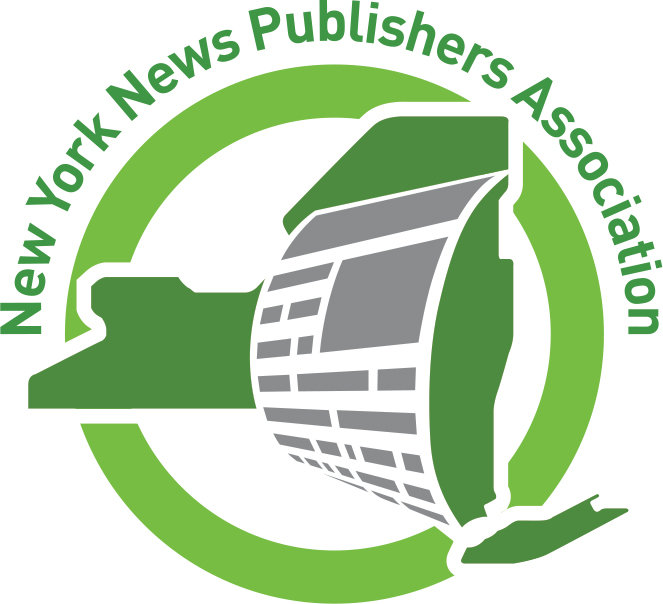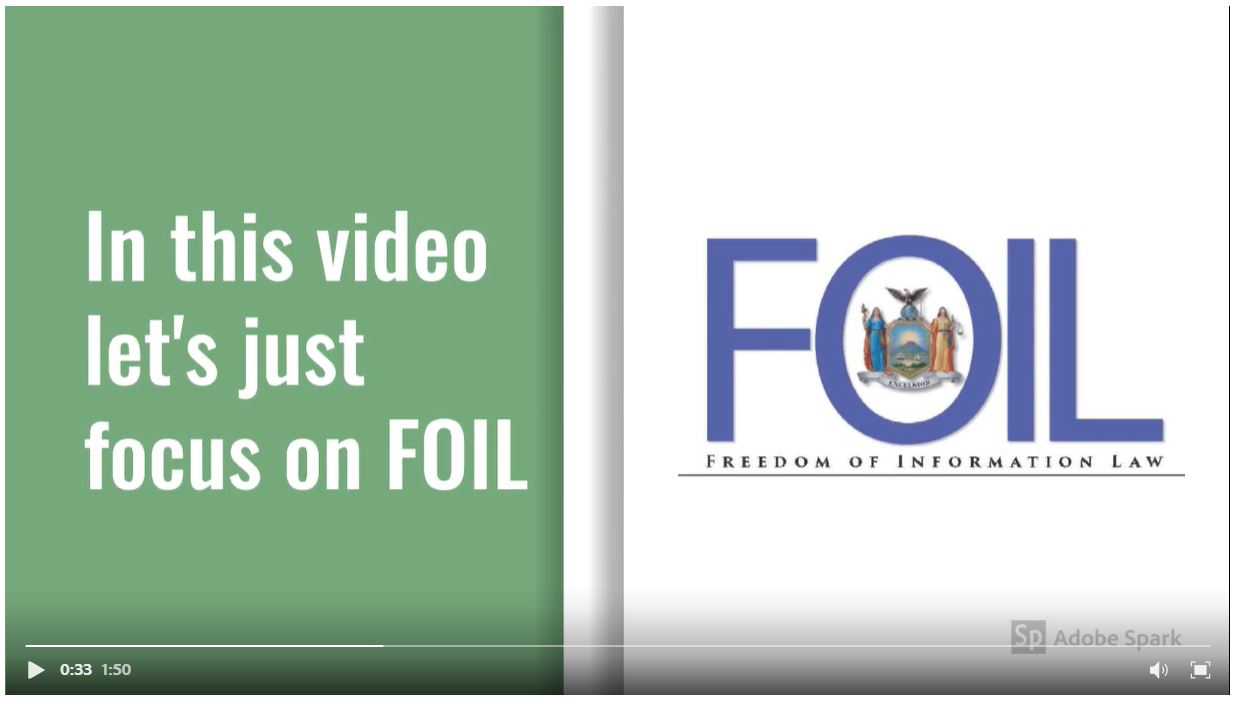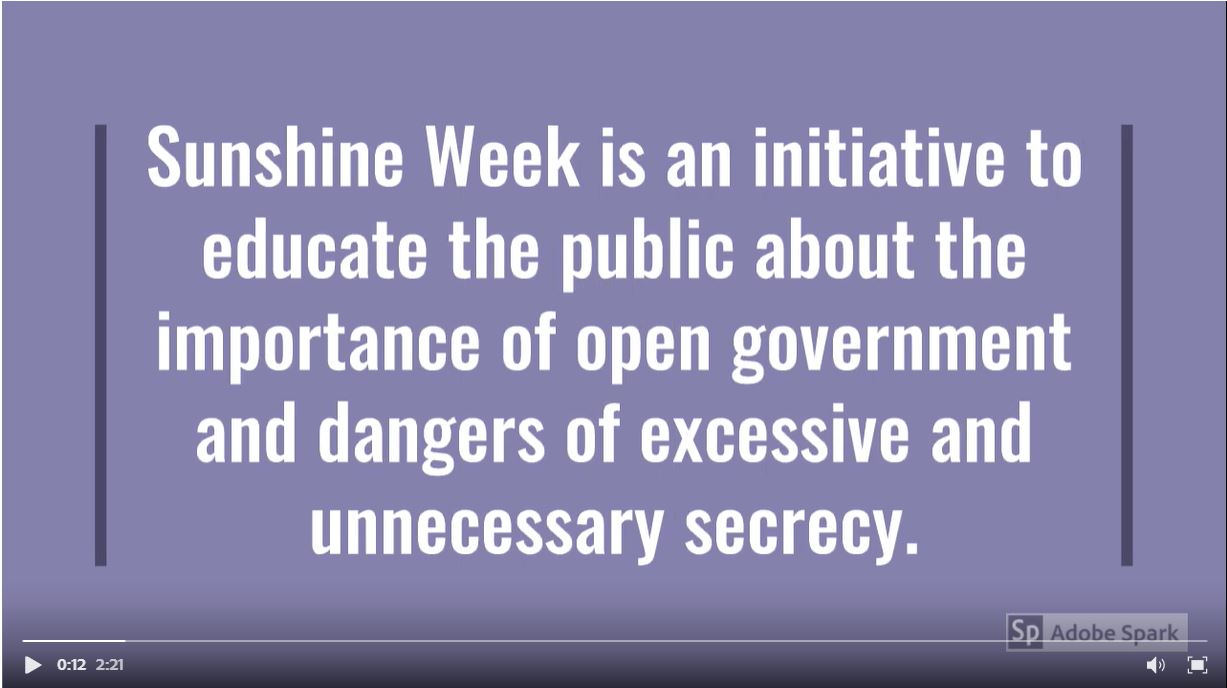|
New York News Publishers Association |
|||
Sunshine Week 2023 - March 12-18
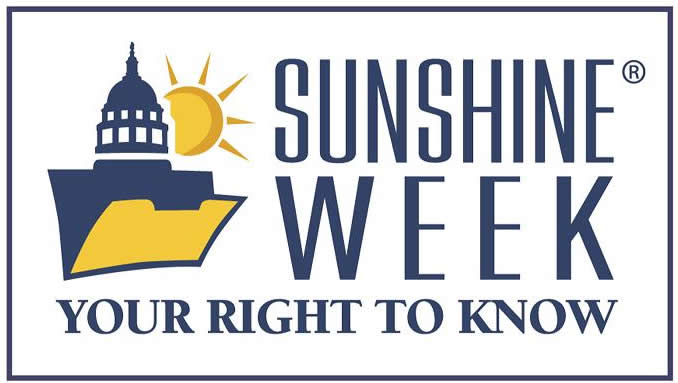
Sunshine Week is a national initiative to promote dialogue about theimportance of open government and freedom of information. Participants include news media, civic groups, libraries, nonprofits, schools and all others interested in the public’s right to know. Sunshine Week seeks to enlighten and empower people to play an active role in their government at all levels, and to give them access to information that makes their lives better and their communities stronger.
 Click here to access a 10-part series of public service announcements in PDF format (2 columns x 6 inches) that can be used to promote Sunshine Week. A sample of one is pictured to the right. (Free for NYNPA member publications to share in print or online - all others contact Mary Miller at mmiller@nynpa.com for affordable copyright pricing).
Click here to access a 10-part series of public service announcements in PDF format (2 columns x 6 inches) that can be used to promote Sunshine Week. A sample of one is pictured to the right. (Free for NYNPA member publications to share in print or online - all others contact Mary Miller at mmiller@nynpa.com for affordable copyright pricing).
Click here to access a teaching guide including graphic organizers highlighting Freedom of Information & Sunshine Week.
Click on the image below to view a short video providing a basic summary of New York state's Freedom of Information Law (FOIL).
Click on the next image to view a short video that highlights New York State's Open Meetings Law.
As editorials and editorial cartoons become available, the content will be posted below. This content is available for all NYNPA member publications to reprint with attribution to increase public awareness of Sunshine Week and the public's right to know. All contributors should sent editorial text or cartoon images to Mary Miller at mmiller@nynpa.com.
Mark C. Mahoney, Editorial Page Editor, The Daily Gazette
|
Some tips to help you fight for your right to knowWe’re always telling people they should fight for their “right to know,” that they should hold public officials accountable by demanding transparency and accountability. We do it for a good reason. Governments that operate in secret tend to act in the best interests of themselves and those close to them. When citizens are informed and active, they help ensure a better government for themselves and their communities. But fighting for transparency and openness isn’t always easy, and the actions one must take are not always obvious. So here are a few things you should know as you join the battle for transparency. For some who are actively involved, much of this will be a mini refresher course. But for many others, some of whom may find themselves interacting with their government for the first time because of an incident that touches them personally, this should provide some basics to help you with your efforts. NEW YORK LAWS First, each state has its own laws and regulations regarding access to information, with some states being more open than others. For those of us who’ve sought to obtain records from New York governments over the years, we’d probably grade the state anywhere from a C-minus to a D in terms of openness. The state’s laws for transparency need some significant improvement, and there is little incentive for governments to comply with them because the laws lack significant enforcement measures. If you’re denied a record or access to a meeting, and the government body won’t budge, you generally have to take the matter to court. Given that governments often have more resources than individual citizens, the governments are often able to win cases by attrition. Going to court is expensive and time consuming, and many people give up or no longer need the records by the time the case is concluded. The scale tilted a little more toward citizens when then-Gov. Andrew Cuomo in 2017 signed a law that requires courts to assess reasonable legal costs in Freedom of Information Law cases in which the citizen “substantially prevailed” and when the court found there was no reasonable basis for denying access to a record. Even with that, government bodies still regularly deny or delay the release of records without consequences. So be prepared to battle in some cases. State lawmakers need to add more teeth to the laws to bring up the state’s grade. All that being said, New York’s Open Meetings Law and Freedom of Information Law (known as FOIL) are pretty simple and clear. You can read the text of the laws and decent summaries of each on the state Committee on Open Government website, opengovernment.ny.gov/. Do yourself a favor and go to the website, and under where it says, “Publications,” print out the pamphlet called, “Your Right to Know.” Most journalists carry a version of this in their pockets any time they attend a meeting (or should). It’s a great reference provided by the state on the Open Meetings and Freedom of Information laws. It covers the process for seeking information, provides a list of all the rules and exemptions, defines what constitutes public records and public meetings, and includes a sample template for filing a request for records and appeals that citizens can simply copy into an email and send to a government official. The state transparency laws operate under the presumption of openness, meaning governments must have a good reason for denying access to records or meetings. MEETINGS Government boards can hold meetings in secret, called “executive sessions,” only as part of a public meeting. And they must have a specific reason for closing the meeting and announce it in public. Reasons for closing a meeting include discussing legal strategy for proposed, pending or current litigation; anything that would jeopardize a law enforcement investigation; and details about the medical, financial or employment history of a person or matters related to disciplining, firing or hiring individuals. The whole list is in the “Your Right to Know” publication. If a board tries to close a meeting citing “personnel,” don’t accept it. That’s not a legitimate reason. They need to be more specific. If they’re discussing the salary for a position, but not for a specific individual, they can’t close the meeting. If they say they want to discuss a possible lawsuit, don’t accept it. The litigation must be pending, proposed or current. If you wonder about the reason, you have a right to stand up and challenge the decision and demand a specific answer. Here are some other things to remember about meetings:
RECORDS OK, now say you want a record. You’ll likely be asked to file a FOIL, or Freedom of Information Law request. Filing a FOIL request is pretty simple. Many government boards now have FOIL forms posted on their websites. Just fill them out and hit ‘send.’ Or use the template provided by the state and mail or email a request to the records clerk. (Check the government’s website.) Be very specific about the records you are seeking. Include a range of dates and name specific portions of documents you want. If you’re too vague, your request will likely be denied and you’ll have to wait longer for the record. You also don’t want the board to bombard you with information you’re not seeking. Government bodies can legally charge residents for the time and effort it takes for them to hunt down records, so ask for a cost estimate in advance to avoid an expensive surprise. (Usually they won’t charge for a few documents, but requests for larger documents can get expensive and take a lot of time to fill.) Boards have five business days to respond to your FOIL. That doesn’t necessarily mean honor it, just tell you what’s next. They’re required to provide you with a general timetable for when you might get the record. But don’t be surprised if they extend that if they don’t want to release the record. If they deny your request, consider refining or narrowing your request and resubmitting it. If you still believe you’re entitled to the record, you can submit an appeal letter demanding a specific reason for denial. FOILs and appeals are free to file and usually don’t require a lawyer. FEDERAL RECORDS LAW Everything we’ve talked about here so far is about state and local governments. The federal government has its own law, the Freedom of Information Act (FOIA), which covers access to federal records. For information about FOIA and how to use that law to fight for your right to know, visit www.foia.gov/. OTHER WAYS to fight Other than attending meetings and requesting documents, you can contact your local and state officials and urge them to support new, stronger transparency laws. In an editorial on Wednesday, we listed some of the open government issues pending in the state Legislature this year. Google more information about these proposals and then email or call your representative in the Assembly and Senate and tell them you want them to support these bills. Follow and support groups online that advocate for open government issues such as the New York News Publishers Association, the New York Coalition for Open Government, Reinvent Albany, the New York Public Interest Research Group (NYPIRG), the Empire Center, the League of Women Voters of New York State, Common Cause New York, Citizens Union and others. Consider joining the New York Coalition for Open Government. It’s a nonprofit, nonpartisan grassroots group made up of ordinary citizens across the state. They advocate for open government issues, hold regular meetings via Zoom and regularly survey government bodies around the state for compliance with the laws. Membership is $20 a year. It’s worth your time to check them out. Visit www.nyopengov.org/. The Gazette is also a strong advocate for open government, and we’ll help you if you have an issue with a local or state government matter. Email Editorial Page Editor Mark Mahoney whenever you have questions or concerns about FOIL or the Open Meetings Law. He’ll be happy to assist you when he can. He can be reached at mmahoney@dailygazette.net. We can have effective, honest and open government, but it won’t happen if we all sit idly by and hope for it. It requires active participation from citizens. We urge you to join the fight. |
Mark C. Mahoney, Editorial Page Editor, The Daily Gazette
|
Little Sunshine in legislative packageState lawmakers generally support Sunshine Week by passing a package of bills that furthers the cause of open government in New York. But this year’s effort is more like a dark cloud. Earlier this week, as part of its Sunshine Week announcement, the state Assembly offered a list of initiatives that at best could be characterized as paltry and at worse offensive. In an editorial earlier this week, we provided a long list of proposed open government legislation the Legislature should consider. It included a tax credit for media organizations to hire local reporters, legislation to strengthen ethics oversight over campaign finance laws, more disclosure of campaign finance reports, requiring judicial candidates to post their campaign finance reports, and closing a loophole in the Open Meetings Law that allow government bodies to meet in secret as political bodies. As extensive as that list was, it didn’t scratch the surface about what lawmakers need to do. But what did we get from lawmakers? We got a milquetoast package of four bills that, while welcome, don’t begin to address the state’s transparency shortfalls. One bill would require Limited Liability Companies (LLCs) entering into a lease with the state to disclose the names and residential address of its members, managers or other authorized individuals. Good and necessary. OK. Another involved closing the loophole that allows government officials to claim copyright protections on work commissioned as a fundamental duty of government. The fact that that needs a law to change it is a travesty in itself. Another would require state agencies to post public documents such as annual reports and studies on their websites. The media and good government groups have been pushing for years for government bodies to post commonly sought records online so that citizens don’t have to request them. This is one step toward that goal. And a fourth bill that would list cryptocurrency assets on financial disclosure statements was actually on the list presented in our editorial and advocated by good government groups. All of these bills will help advance the cause of open government in New York, but in very small and narrow increments. Lawmakers had an opportunity to use Sunshine Week to significantly strengthen the state’s open government laws and to make the state more open and transparent for the citizens. What they actually did falls woefully short of what they could have, and should have, done. There’s still time left in the legislative session to pass more substantial open government legislation. Let’s hope what they’ve done so far is only a preview and not the final outcome. |
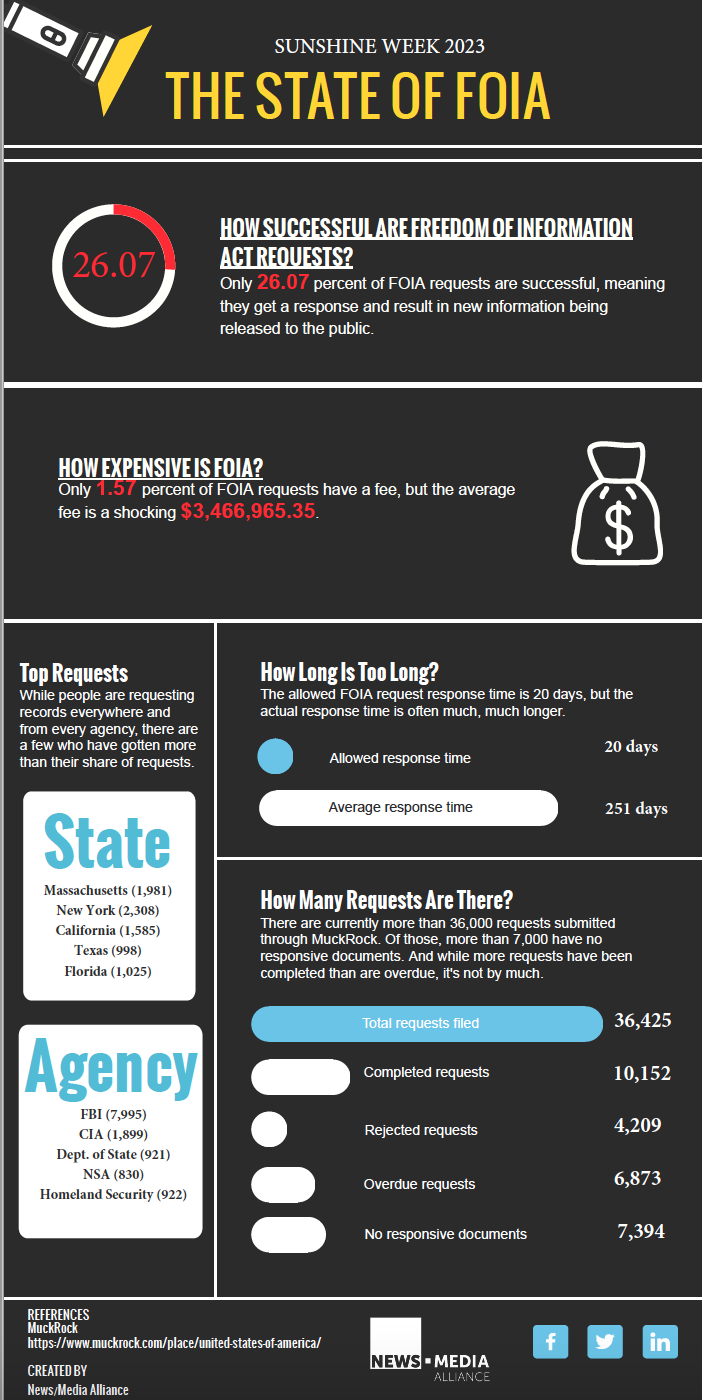
Mark C. Mahoney, Editorial Page Editor, The Daily Gazette
|
Gatekeepers control access to public’s right to knowWhen it comes to open government, there’s an inherent conflict in the process. The government officials who are subject to the state’s transparency laws — laws that might expose their secrecy, inefficiency, incompetence and fraud — are the very same people who make the laws. In order to have open government, we must rely on public officials who don’t fear transparency and who respect the public’s right to know. More than ever, we need these people to take the lead and support open government legislation. This year, there are a number of bills pending in the state Legislature that are vital to ensuring a fair and open government in New York. Good government organizations, civil rights groups and news organizations are among those advocating for this important legislation. One group, Reinvent Albany, has proposed a set of bills that would strengthen ethics oversight on campaign finance laws. These bills would help the public identify any potential conflicts of interest involving candidates and businesses, business associates, family members and friends who donate to their campaigns. The legislation would make it easier for the public to identify these potential conflicts before voters head to the polls. Among those bills are those that would require electronic filing of disclosure statements, posting of disclosure statements on campaign websites, including crypto holdings in financial disclosure forms, requiring members of regional economic development councils to file financial disclosure statements and make them subject to state transparency laws, and requiring online publication of judges’ financial disclosure statements. In February, a collection of watchdog groups — including the New York News Publishers Association, Empire Center, New York Public Interest Research Group (NYPIRG) and Reinvent Albany — called for legislation to subject government “advisory” bodies to the Open Meetings Law, limit commercial exemptions to the Freedom of Information Law (FOIL) to three years, and end the “consultant report exemption” to allow the public access to consultant reports funded with taxpayer dollars. These groups also supported the new financial disclosure laws. The New York Coalition For Open Government has called for lawmakers to close the loophole in the state Open Meetings Law that allows public officials to meet in secret under the guise of a political caucus. It has also called for more state funding to support open government efforts, including boosting staffing at the state Committee on Open Government and providing local governments with financing for the technology to broadcast and store videos of their meetings. But change isn’t just needed at the state level. Local governments control how much access they provide to the public by deliberately delaying or denying public access to records without fear of reprisal. Surveys by the Coalition For Open Government have found many local government boards routinely flout laws on responding in a timely manner to Freedom of Information Law (FOIL) requests, posting meeting agendas and documents online in advance of meetings, and posting video records of meetings. And despite the fact that state lawmakers opened up certain police disciplinary records to public scrutiny three years ago, police agencies at all levels continue to deny access and fight disclosure efforts in court. Governments often get away with violating the Open Meetings Law and FOIL because lawmakers have made it so difficult, time-consuming and costly for ordinary citizens to appeal the denials of records or access. If our transparency laws are to be effective, state lawmakers need to make it more difficult for governments at all levels to violate them. They can do that by giving courts the power to impose sanctions against government bodies that obstruct access to records and meetings. The people who make our laws have a special obligation to ensure open and honest government. They can honor that obligation by passing the vital open government bills that are before them this legislative session, and by pledging at all times to support and strengthen the public’s right to know. |
|
Associate Attorney General Vanita Gupta Delivers Remarks at the Justice Department's Sunshine Week CelebrationThe Department of Justice held its annual Sunshine Week celebration in recognition of the importance of FOIA for government transparency and to honor the efforts of those professionals dedicated to the success of their agencies’ FOIA administration. Click here to view the video recording of the celebration on YouTube (Approximately 1 hour) |
Letter Signers John Kaehny
|
Group letter urges Legislature to pass "Sunshine Week" billsDear Majority Leader Stewart-Cousins and Speaker Heastie, We write to ask that for this year’s Sunshine Week (March 12-18), your houses work jointly to pass the same bills increasing transparency in New York. Since at least 2007, both the Senate and Assembly have regularly passed bills during Sunshine Week to improve NY’s Freedom of Information and Open Meetings laws (FOIL and OML). However, the houses rarely pass the same bills. For example, in 2021, the Assembly passed at least four bills improving transparency, but the Senate passed none. In 2022, the Senate passed at least five transparency bills during Sunshine Week, but the Assembly passed none. Some of these bills were eventually passed in the other house, but most never moved. We believe that aligning your efforts to pass the same bills will help increase transparency and send a strong message that the Legislature is working together to bring more sunlight to New York. The legislation will also help the Legislature to better conduct oversight of state government. Here are several bills that our groups urge you to jointly pass this upcoming Sunshine Week: Closing the “advisory body” OML loophole – Legislation passed in 2021 made it so that public bodies that are “purely advisory” but were a creation of law 1 no longer have to hold open meetings. This appears to have contradicted the Legislature’s intent. The Legislature needs to close the loophole so that these advisory bodies are again subject to the Open Meetings Law – as they have been historically.
Financial disclosure bills:
We would welcome the opportunity to discuss these proposals with you and/or the relevant staff members. Please contact Tom Speaker at tom@reinventalbany.org to schedule a meeting. We thank you for your consideration. |
Citizen Editorial Board The Citizen Editorial board includes executive editor Jeremy Boyer and managing editor Mike Dowd.
|
Sunshine Week remains as vital as ever"The ability to improve any system's functioning does require the administration of some sunlight." — Lucy Lang, New York state inspector general In December, The Citizen published a story that brought to light conditions inside a home that Auburn officials have cited for operating as an illegal boarding house. In October, a story about a closed downtown business, which had stopped making payments on a taxpayer-funded loan from the city, included details of similar issues between the business and its landlord. September featured a report on behind-the-scenes maneuvering between the governor's office and local Democrats to try to convince Gov. Kathy Hochul to use her power to appoint a new Cayuga County district attorney. Those are just three examples of reporting from the final third of 2022 that included vital information obtained from state Freedom of Information Law requests. Commonly referred to as FOIL in New York state, the law provides a foundation for government transparency at the state and local agency level. We bring up FOIL today in conjunction with the launch of Sunshine Week, a nationwide annual effort that, in the words of its sponsors, promotes "open government and shine light into the dark recesses of government secrecy." Now in its 19th year, Sunshine Week in 2023 is being organized by the News Leaders Association and The Society of Professional Journalists to host Sunshine Week, two outstanding journalism organizations. We encourage everyone to pay a visit this week to sunshineweek.org, and the account @sunshineweek on Twitter, so you can check out the conversations that are happening regarding government transparency. Another helpful resource at the national level is the federal Office of Information Policy's Freedom of Information act website at foia.gov. In New York, the state Committee on Open Government has been a resource for anyone, journalists or citizens, who have questions about the state's Freedom of Information and Open Meetings laws, as well as laws covering access to the judicial branch of state government. Its website at dos.ny.gov/coog has helpful videos, tons of official advisory opinions on matters pertaining to government transparency law in New York state and instructions on filing FOIL requests and appeals with templates. One of the most important messages of Sunshine Week is that these laws and tools are not just for journalists. Every person has a right to public information, and it's important that more people understand how to exercise that right. |
Mark C. Mahoney, Editorial Page Editor, The Daily Gazette
|
Fight for government transparency more challenging than everIt seems these days that cameras are everywhere to capture our every action. In stores and businesses, pointing at our cars at stop lights and allowing us to record and post everything from photos of our dogs to images of police brutality. It’s like we’ve got nowhere to hide. Unfortunately, we don’t have cameras pointed at our elected officials when they meet in secret or when they discuss the public’s business outside of our view. No camera can stop a government body that withholds a public document or holds public records hostage, inviting an expensive and time-consuming court battle. There’s no TikTok video available to convince state lawmakers to strengthen our laws to make government more transparent or for the courts to uphold these laws. The most vital tools we have to fight government secrecy and promote openness are our own attention to governments that seek to act against our interests, and our own diligence in holding them accountable. That’s what Sunshine Week is all about. Starting today and continuing throughout the week, news organizations like ours are joining with government watchdog groups and civic and legal organizations to remind citizens of the need more than ever to fight for open government. Government secrecy deprives us of the opportunity to know how our laws are being passed and how our tax money is being spent. It deprives us of the opportunity to know whether our public officials are acting in our best interests or are using their political offices to benefit themselves and those close to them. Secret meetings deprive us of the opportunity to witness and participate in debates over issues that directly affect our lives. The illegal withholding of public documents by government officials deprives us of the opportunity to investigate for ourselves whether government is serving us effectively, and it limits our ability to challenge their actions and hold them accountable. The bad news is that the fight for transparency has become a Sisyphean task in recent years. With increased demands on our lives, many of us are unable to devote the time to attend public meetings and engage our officials. With news organizations downsizing, there are fewer local news reporters sitting at meetings calling out illegal actions and taking the time to demand and review records. The state agency that once vigorously advocated for our right to know is now merely a quiet resource. And as people become more concerned about personal privacy, lawmakers are passing laws and taking other actions to deprive citizens of their right to know about such matters as police disciplinary records, body and vehicle camera footage, arrests and criminal backgrounds, and government contract negotiations. That’s all made the challenge to maintain a government that’s open and responsive much more difficult. The good news is that there are still journalists on the ground who are committed to open government and who are still fighting for access on the citizens’ behalf. There are still government watchdog groups like the New York Coalition for Open Government, Reinvent Albany, the Empire Center for Public Policy, the New York Public Interest Research Group (NYPIRG) and others that are committed to open government and aggressive in their fight to preserve it. And there are still individual citizens and groups among us who demand to see public records, who stand up at meetings and call out public officials, who take it upon themselves to fight for our rights on behalf of all of us. Sunshine Week is the time to get reinvigorated and to recommit ourselves to a fair, responsive and open government. The task is more daunting than ever, and it will require all of us to step in and step up. Keep the light shining on government. |

Cartoon courtesy of Adam Zyglis, The Buffalo News
Please note: Previous Sunshine Week content is still available for download and use.
Click here to access the eight newspaper in education features created for 2012 (3 column x 8 inches) - an overview of NYS FOIL, Open Meetings, How to gain access to records and one freature on Freedom of Information and NYS Courts.
Click here to access the five-part series of features highlights just a few of the websites with reports and other data that may be of interest to students and the general public. Graphic organizers to accompany these features are also available here as PDF download. The topics included:
• What is “E-Government”? – A brief summary of our “Cyber Sunshine” focus
• Vehicle Safety – Highway Safety Data
• Food Safety – Restaurant Inspection Reports
• School Safety – Violence and Disruptive Incident Report
f you'd like to make a donation to the NYNPA Newspaper In Education program, simply press the Donation button below.
New York News Publishers Association, Inc.
Phone/Fax (518) 449-1667 - Toll-free: (800) 777-1667
